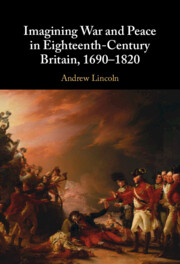
- Publisher:
- Cambridge University Press
- Online publication date:
- January 2024
- Print publication year:
- 2023
- Online ISBN:
- 9781009366519
- Subjects:
- Literature, English Literature 1700-1830

Ranging over political, moral, religious, artistic and literary developments in eighteenth-century Britain, Andrew Lincoln explains in a clear and engaging style how the 'civilizing process' and the rise of humanitarianism, far from inhibiting war, helped to make it acceptable to a modern commercial society. In a close examination of a wide variety of illuminating examples, he shows how criticism of the terrible effects of war could be used to promote the nation's war-making. His study explores how ideas and methods were developed to provide the British public with moral insulation from the overseas violence they read about, and from the dire effects of war they encountered at home. It shows, too, how the first campaigning peace society, while promoting pacificism, drew inspiration from the prospects opened by imperial conquest. This volume is an important and timely call to rethink how we understand the cultural and moral foundations of imperial Britain.
‘Lincoln’s book has at its heart a fascinating question: how do eighteenth-century Britons manage at the same time to see themselves as increasingly civilized and as almost perpetually committed to war? In clear, strong prose, Lincoln moves across the long eighteenth century, tackling both a wide range of literary texts and other cultural works including philosophy and journalism and treating both hypercanonical authors (such as Austen) and texts clearly deserving more attention (Richard Glover’s Leonidas). Avoiding a reductive binary between war and civilization, he provides a panoramic view of how Britons thought about war and dreamed of peace.’
Jeffrey Cox - Distinguished Professor of English and Humanities, University of Colorado, Boulder
‘In this rich and expansive study, Lincoln shows that eighteenth-century writers responded to the moral dilemmas posed by modern warfare with a wide range of caveats and compromises, strategies and solutions. Lincoln is an immensely knowledgeable guide to eighteenth-century writing about war, and this fascinating book makes an important contribution to scholarship in the field.’
Julia Banister - Senior Lecturer in English Literature, Leeds Beckett University
 Loading metrics...
Loading metrics...
* Views captured on Cambridge Core between #date#. This data will be updated every 24 hours.
Usage data cannot currently be displayed.